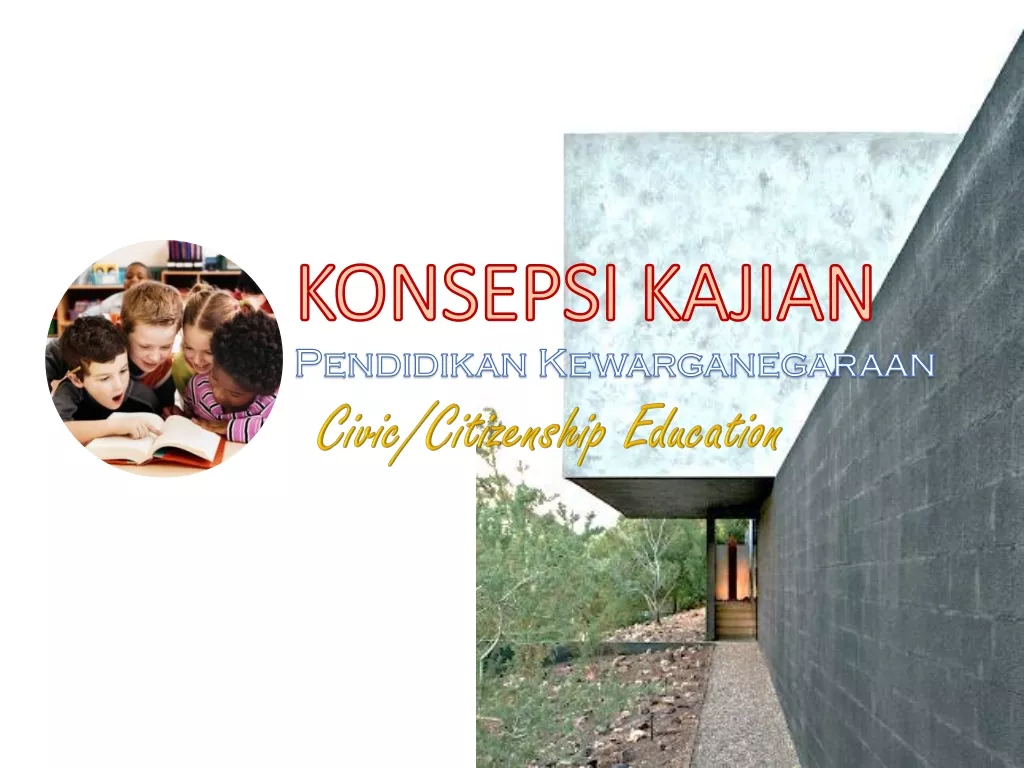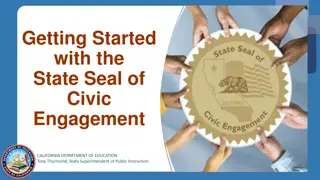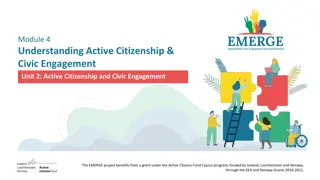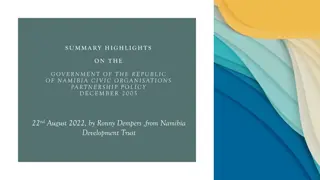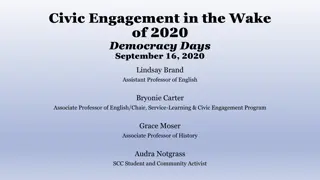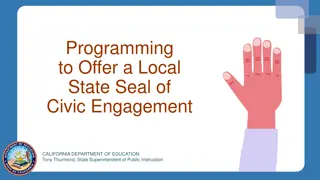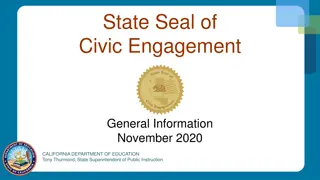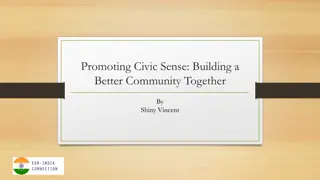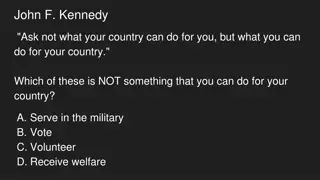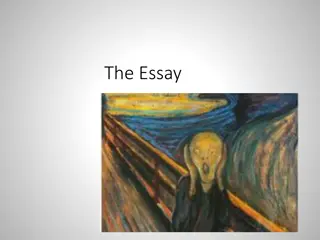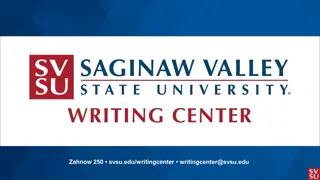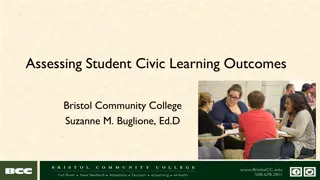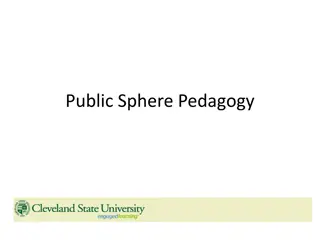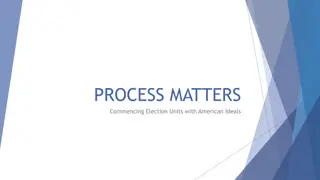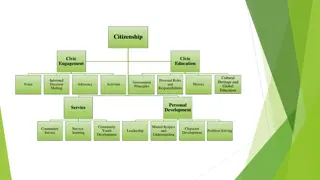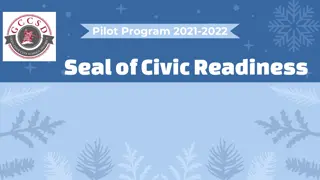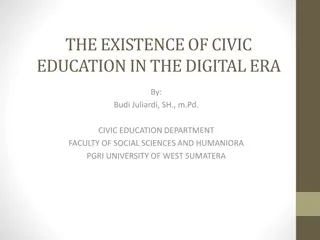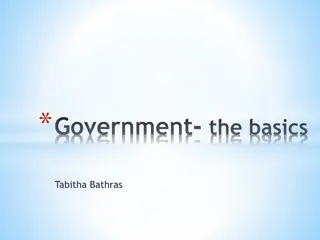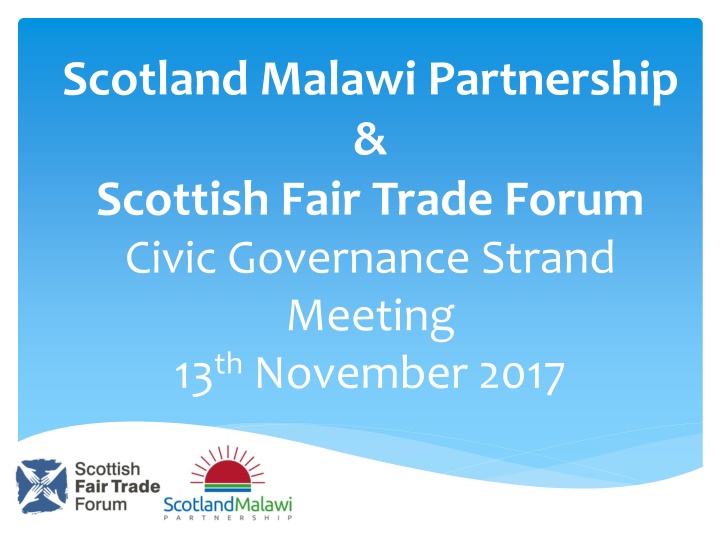
Insights on Governance Projects in Malawi - Cultural Factors and Advocacy Needs
Explore valuable insights from the Malawi Panel on cultural factors to consider when designing governance projects, as well as the critical information and evidence required for effective advocacy work in the region.
Download Presentation

Please find below an Image/Link to download the presentation.
The content on the website is provided AS IS for your information and personal use only. It may not be sold, licensed, or shared on other websites without obtaining consent from the author. If you encounter any issues during the download, it is possible that the publisher has removed the file from their server.
You are allowed to download the files provided on this website for personal or commercial use, subject to the condition that they are used lawfully. All files are the property of their respective owners.
The content on the website is provided AS IS for your information and personal use only. It may not be sold, licensed, or shared on other websites without obtaining consent from the author.
E N D
Presentation Transcript
Scotland Malawi Partnership & Scottish Fair Trade Forum Civic Governance Strand Meeting 13th November 2017
Malawian input panel Malawi Panel: Mavuto Bamusi, Presidential Advisor on CSO s and former CSO Head Brier Mlowoka, Evangelical Association of Malawi Phillip Kamangila, Activist Charles Kasambara, Centre of Legal Assistance
Questions for Malawi Panel Question: What cultural factors should Scots be aware of when designing new governance projects? Answers: Malawi has a very diverse culture. Usually a talk with NGO s, or a baseline should quickly resolve the issue of culture.
Questions for Malawi Panel Question: What kinds of information or evidence do you require most to guide and support your advocacy work? Answers: Advocacy in Malawi works better if it is people-centred and brings infallible evidence. For this there are two scales at which advocacy work can be done: at local level to influence local allocation of resources, or go large- scale using bigger NGO s to influence decision-making across districts.
Questions for Malawi Panel Question: What kinds of information or evidence do you require most to guide and support your advocacy work? Answers: The evidence needed is on how goods and services are being delivered, how that is affecting their access by citizens and what evidence the citizens have about the effects.
Questions for Malawi Panel Question: What kinds of information or evidence do you require most to guide and support your advocacy work? Answers: Malawi Civil Society needs evidence-based advocacy otherwise the government has very knowledgeable people (human resource) to counter argue advocacy efforts by the civil society. People from civil society need information that shows that it is not reactive but rather proactive. The civil society should have a think tank or a database where they can tap information before engaging in any advocacy work.
Questions for Malawi Panel Question: What kinds of information or evidence do you require most to guide and support your advocacy work? Answers: Evidence-based advocacy, need information from research, baseline survey the advocacy should come from consultations and the information should be backed by community members, etc.
Questions for Malawi Panel Question: How do you see future leaders emerging from the young people of Malawi who represent such a large part of the population? Answers: Young people hold the key to Malawi s Development Agenda. The next election, for example, happening in 2019 shall be decided by the youth, most of whom did not vote in the 2014 general election but will be eligible to vote in this coming election. Therefore, candidates who shall speak the language of young people in terms of job creation, etc. will have a better chance. In that regard, young people may also be largely inclined to support young candidates as well.
Questions for Malawi Panel Question: How do you see future leaders emerging from the young people of Malawi who represent such a large part of the population? Answers: It is indisputable fact that Malawi s population constitutes 76% of the youthful group. They are the most reliable human capital Malawi can capitalise on. However there has been little progress until recent times when most of the youth are becoming actively participative in matters directly affecting them. Against this background, most of the young people have taken bold steps in lobbying for space in those positions that seem to be so much involved in the decision-making processes. Suffice to say, we still need much effort in empowering this group so that many can emerge and challenge in the leadership positions. Like the upcoming tripartite elections in 2019, most of the contestants and voters will be the youth.
Questions for Malawi Panel Question: What support and refuge is available to women and children fleeing violence? Answers: Women and children mostly flee during the floods. Apart from food and shelter provided by humanitarian teams, they remain vulnerable. We have a report on this which can be shared.
Questions for Malawi Panel Question: What support and refuge is available to women and children fleeing violence? Answers: We have victim support units at most police stations. However, they are under resourced to manage the many cases they receive. We also have local CSO s who provide temporary shelter to women and children fleeing from violence. The government also has a social welfare department within the Ministry of Gender and Child Welfare, which also provides shelter and support to them.
Questions for Malawi Panel Question: What barriers, if any, exist that prevent citizens from challenging individual human rights abuses through the courts? Answers: Stigma attached to most cases. Consider a rape case. So while one would get the legal justice they are bound to get social injustices. The community would isolate them. How would you report this matter to police? Now that the man is jailed, who takes care of his family, etc? The other barrier is that most of such cases are never completed, especially when they involve people of influence or those with money. Therefore, people do not feel the need to report it and that justice is denied.
Questions for Malawi Panel Question: What barriers, if any, exist that prevent citizens from challenging individual human rights abuses through the courts? Answers: For ordinary citizens at grassroots level, they lack mobilisational capacity and resources. Courts are very corrupt and that goes against the poor. It is only NO represent citizens that they get justice.
Questions for Malawi Panel Question: What barriers, if any, exist that prevent citizens from challenging individual human rights abuses through the courts? Answers: 1. Illiteracy rate and complicated court procedures that make it difficult prevent them from accessing remedies. 2. The biggest abuser of human rights is the State. In most cases when duty bearers violate people s rights, there is an element of impunity. For instance, if a police officer or a prison warden commits a violation, the procedure is that you normally sue the Attory General and the individual does not take personal responsibility. The system easily protects him, hides him, his/her colleagues manipulate the procedures and individuals easily give up. 3. The distance from the villages to travel to cities maybe due to lack of money for transporation, frequent adjournements, illiteracy and it becomes costly to an ordinary person. 4. Delays in getting remedies and people usually give up before the case is concluded. 5. Corruption within the criminal justice system like judges being bribed or judge shopping, missing of files, or missing part of the documents in the files. 6. Courts in Malawi use foreign language, ie. English and sometimes interpreters do not do a good job. 7. It is costly for an ordinary Malawian to pursue an issue with the Magistrate Court, then High Court, then Supreme Court or African/International Court because very few can afford to hire a lawyer and if the State provides a Lawyer from the Legal Aid Bureau, usually, they are not experienced compared to private lawyers.
Questions for Malawi Panel Question: What barriers, if any, exist that prevent citizens from challenging individual human rights abuses through the courts? Answers: The common barrier in Court is language. Most of the culprits can never understand as they may not have gone to school or just not educated to the extent of understanding all legal and technical languages. Secondly, Malawian Courts are not open as many are in the cage as a result of lack of knowledge. Prosecution is always done Police officers are in their uniforms and yet it is already intimidating and traumatising resulting into perpetuation of human rights abuses. Court procedures are subject to serious human rights abuses. For instance, when someone has been accused of a crime, they are forced to ask questions even on matters they don t fully understand.
Questions for Malawi Panel Question: What barriers, if any, exist that prevent citizens from challenging individual human rights abuses through the courts? Answers: The delay of processing Court cases is another parameter in which individual human rights are subjected to abuse. Some may be on remand for a year and this has negatively contributed in the promotion of human rights as enshrined in most legal and policy instruments to which Malawi is a party.
Questions for Malawi Panel Question: What barriers, if any, exist that hinder civil society organisations from speaking out on human rights? Answers: Sometimes its lack of tangible evidence. Also sometimes its because the victims, if any, do not want to speak out. Also there is a lack of following through on cases of human rights violations as such people do not feel the need to actively engage.
Questions for Malawi Panel Question: What barriers, if any, exist that hinder civil society organisations from speaking out on human rights? Answers: Political influences that sometimes divide CSO s and prevent them from speaking with one voice. Political targeting of CSO leaders for grilling on public TV. But generally, the space to operate as CSO s is available. The greatest challenge is that most CSO s are resource constrained.
Questions for Malawi Panel Question: Women may represent a small proportion of the prison population in Malawi, but how are issues of gender equality, health and education addressed in their rehabilitation? Answers: Not sure if this question is being asked for women within the prisons or those who have finished their sentences, but generally women prisoners have it bettr than their male counterparts. On education in prisons, much is usually reported on males, not so much on females.
Questions for Malawi Panel Question: Women may represent a small proportion of the prison population in Malawi, but how are issues of gender equality, health and education addressed in their rehabilitation? Answers: Women are very few compared to their male counterparts. However, when it comes to rehabilitation, women are much better compared to their male counterparts. There is no question of gender equality in prisons. The area that has not been seriously considered is to do with special needs for women. For instance, women are not provided menstrual pads and this is a health hazard issue. It affects women and it is a particular problem for women and these are not provided for. They end up using pieces of clothes from their Chitenjes .
Questions for Malawi Panel Question: Women may represent a small proportion of the prison population in Malawi, but how are issues of gender equality, health and education addressed in their rehabilitation? Answers: When it comes to health in general, women are better off compared to their male counterparts. For instance, they access the St Maula clinic, they eat well (they are allowed to cook on their own), many outsiders bring them food (different churches or charitable groups) who prefer to donate to the female section than male section because they are few. Some donors could even dictate which category of prisoners should benefit from their funding, ie. the Royal Norwegian Embassy could demand through NGO s like CELA to construct modern self-contained cells for women only with good space, beds with mattresses and pillows, many showers and toilets, mosquito nets, etc. This is not the case with men who are congested and sleep like bags of maize Shamba , use buckets for toilets during the night. Prisoners with TB are mixed with healthy ones due to lack of space, problem of ventilation/overcrowding it is even worse for the elderly prisoners and places like Nkhota-kota prison. 500 prisoners use one tap and two toilets, etc. In prison, health issues cannot easily be discussed here. However, getting TB in prison is not part of the sentence. For education, women have access to formal education and vocational training. CELA constructed the girl s reformatory centre in Mzuzu with help from the Norwegians where the cells are self-contained with beds, blankets, mattresses, pillows, they have a computer room, they have formal education, kitchens, a library, and are trained in vocational skills. When it comes to rehabilitation efforts, women are much better than men. Furthermore, women s health is considered a priority compared to men, especially those who are pregnant, lactating, or those with children regardless of the available meagre resources in prisons. What could be done on rehabilitation for women should be more of imparting entrepeneurship and life skills, not just general education. Men have done well in some cases when it comes to formal education. Some prisoners have scored highly and there should be a clear policy on what happens when a prisoner does well in national exams and deserves to go to the university. In a nutshell, there has been no standardisation efforts to see to it that prisoners in Malawi regardless of their gender, some rehabilitation efforts in education and health should have been directed towards designing national pogrammes.
Questions for Malawi Panel Question: How can we improve transparency and accountability at local district level and at national government level? Answers: There s no single approach that can help improve transparency and accountability. From our experience, simple scorecard-based approaches have worked well. There s greater potency in working with the media on investigative stories that bring greater evidence on services.
Questions for Malawi Panel Question: How can we improve transparency and accountability at local district level and at national government level? Answers: Strengthen capacity and local district levels. Also engage and sensitize communities to engage with local authorities in a meaningful manner. Locals will start demanding services when they are aware of what the local authorities are supposed to provide. That will inherently improve transparency and accountability especially when the communities are also actively involved in project planning and implementation. Budget tracking at national level can improve transparency this shall also entail empowering CSO s to be vigilant on their checks and balances role and ensuring that government on the other hand provides relevant information.
Questions for Malawi Panel Question: What are the key ways in which we need to strengthen civil society? Answers: CSO s can be strengthened in many ways. One of which would be for them to regain their lost legitimacy. Over the past, CSO s were vigilant in the provision of checks and balances to government as well as critical alternatives. The most vulnerable people at local level have been assisted by CSO s. But of late, that trend has changed. Everyone wants to do advocacy and unfortunately, advocacy isn t working anymore due to the issues of legitimacy. Also, most CSO s lack financial management skills as well as reporting for results. This has affected scale-up of projects which would have otherwise assisted many people.
Questions for Malawi Panel Question: What are the key ways in which we need to strengthen civil society? Answers: There are several ways how civil society can be strengthened. 1. There is a need to revive HRCC (Human Rights Consultative Committee), a grouping of all human rights organisations in Malawi. This group used to do advocacy work as a team but due to lack of funding, it means that human rights organisations cannot come together and look at issues through their various thematic areas. This group was different from Council of non-governmental organisations or NGO Board because these bodies are easily influenced by the government. In other words, these bodies are there to weaken the civil society and the government is using these two bodies to weaken those NGO s that have different views on policies or laws. The HRCC is a crucial body in strengthening civil society s voice in Malawi. 2. The Scottish Government should see some sustainable ways like supporting things that can help NGO s to stand on their own, like support towards office space or to allow NGO s to invest in things that may bring income to the organisation, ie. Revolving funds. 3. To support networking and collaboration in various thematic areas. 4. To support programmes as opposed to projects. 5. To encourage exchange programmes with like-minded institutions within the region. 6. To encourage baseline survey and evidence-based advocacy to regain confidence from the public and government. 7. To build their capacities through training in their fields of specialisation. It has always been noted that the government generally has well educated people and people from the civil society fail to argue/compete with civil servants (the literacy gap due to the level of education). Most people from NGO s fail their advocacy work or writing good press statements, petitions, analyse policies, contribute to the emerging bills, reviewing existing Acts, etc. In a nutshell, civil society needs to strengthen their human, technical and financial resources. It is always the case in Malawi that a good calibre of Advocates do not survive in the civil society because the government easily offers them good positions in government. It is due to lack of job security, unfavourable working conditions, and threats from government.
Questions for Malawi Panel Question: What are the key ways in which we need to strengthen civil society? Answers: Civil society in Malawi is already strong. It s major challenge are material resources because many CSO s lack sustainable links. What is needed are lessons from other countries on how to make voices count.
Questions for Malawi Panel Question: Why have some past governance projects failed to have had the desired impact? What are the common mistakes made? Answers: There have been many successful governance projects and most of these have clear common features. 1. Life span of no less than three years, 2. Strong follow-up and institutionalisation processes, 3. Consistency in working with citizens from grassroots, district and national levels.
Questions for Malawi Panel Question: Why have some past governance projects failed to have had the desired impact? What are the common mistakes made? Answers: Because some would be one-sided only looking at the wrong and never providing alternative solutions.
Scotland Malawi Partnership & Scottish Fair Trade Forum Sustainable Economic Development Strand Meeting 9th November 2017

